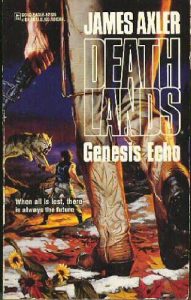 Cool story: Genesis Echo is either the third or fourth in a series of Deathlands cliffhangers, and pleasingly also the last. I mean, of the series of cliffhangers. There might be more cliffhangers later. There’s like a hundred books left in Deathlands the series.
Cool story: Genesis Echo is either the third or fourth in a series of Deathlands cliffhangers, and pleasingly also the last. I mean, of the series of cliffhangers. There might be more cliffhangers later. There’s like a hundred books left in Deathlands the series.
Anyway, aside from cliffhanger resolutions, this was mostly a medical horror story. Because, if you take a bunch of scientists from apocalypse era and mostly cut them off from everything for a hundred years (because that’s how they survive the post-apocalypse) but they lose a lot of their knowledge because of a fire, and also the world is terrible, but they’re determined to keep being scientists a hundred years later? Yeah, it’s like that.
So, different topic. A thing I like about these books that I probably haven’t mentioned yet is the willingness to do random things that feel more like real life than like a plotted book. In this case (spoilers, but you know you don’t care), last book and into this book, Doc (the guy from the 1890s who was pulled forward in time by scientists in the 1990s, but he was too much of a pain so they sent him forward another hundred years to the beginning of this series to get rid of him) met a nice lady while on walkabout in the mountains of western New Mexico, and brought her home to meet his friends. She was not fond of the idea of going into a teleporter (partly because, reasonably, she didn’t really understand what was going on) and ran away at the last second.
Her ultimate fate is unknown, but a chunk of her boot was left behind because it wasn’t clear of the teleport circle when the rest of them went off to the aforementioned medical horror story. So, like, did she live, or is there a border zone where you just get teleported into nothingness? If she did live, is she okay? Is she angry? Will they ever meet her again? I have no idea, and neither, for now, does the author. But someday, I bet I’ll get some kind of answer. Which, I’ve lost track of my point.
My point was, it doesn’t matter, it’s just a thing that happened and maybe they’ll never know, because usually you do never know. The only reason I think I’ll get an answer someday is because, like I said, there’s a hundred more books and that’s a long time to go without revisiting a person who left on a giant question mark.
I also still want them to go back to one of the space stations and/or moon bases that are out there that they found once before, but tragically depressurized and therefore not possible to explore. (Or, y’know, maybe people would still be alive if not. Well, descendants. Whatever. Either way, that would be cool.)
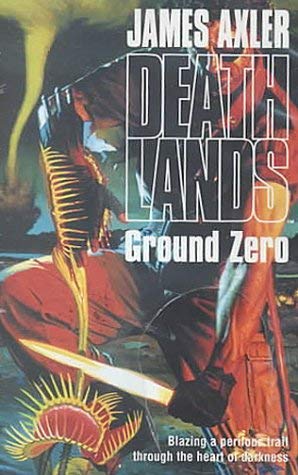 Sometimes the title of a Deathlands book will make me scratch my head in puzzlement, since it seems like they just took a couple of random words, one of them semi-complex, and strung them together, irrespective of the plot of the book. Other times, such as Ground Zero, I’m pretty well on board.
Sometimes the title of a Deathlands book will make me scratch my head in puzzlement, since it seems like they just took a couple of random words, one of them semi-complex, and strung them together, irrespective of the plot of the book. Other times, such as Ground Zero, I’m pretty well on board.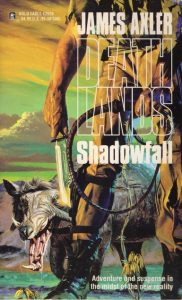 By now you know the Deathlands drill, or have been ignoring reviews of the series and will ignore this one too. The main things that stand out about
By now you know the Deathlands drill, or have been ignoring reviews of the series and will ignore this one too. The main things that stand out about  Cool story:
Cool story: 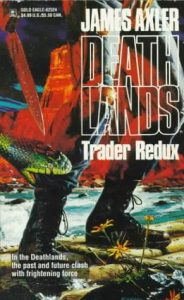 Because Mary is way behind me, it’s too soon to start the next Liveship book. And because
Because Mary is way behind me, it’s too soon to start the next Liveship book. And because 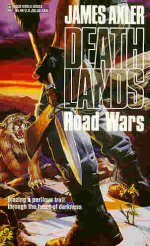 Vacation nearly always equals Deathlands. And on the bright side, I didn’t run out of book before the plane landed, if only by about 20 minutes of reading.
Vacation nearly always equals Deathlands. And on the bright side, I didn’t run out of book before the plane landed, if only by about 20 minutes of reading.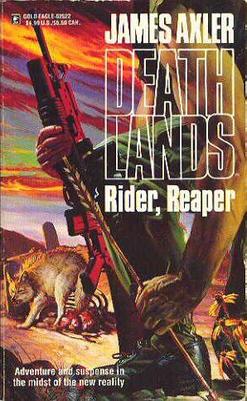 I liked this Deathlands book somewhat less than usual, for a variety of reasons, which I will now elucidate.
I liked this Deathlands book somewhat less than usual, for a variety of reasons, which I will now elucidate.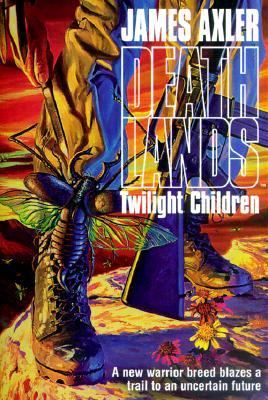 On Sunday, I read
On Sunday, I read 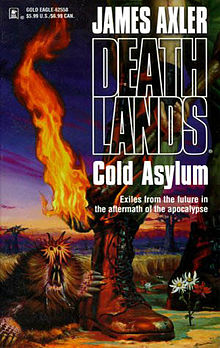 On Saturday I read
On Saturday I read 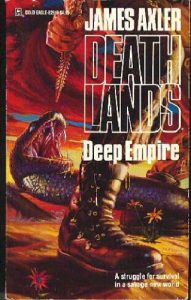 If you are paying a lot more attention than I would expect anyone to be paying, you would expect this review to cover the second Robin Hobb book. However, I ran into a pair of related problems. Maybe a trio of interrelated problems? You decide! See, thing one is that I’m still trying to read the series in conjunction with my wife. Thing two is that I went camping last weekend. The problem with that is that while I read a lot in the woods, she really does not. Thing three, which may or may not count as an actual thing, is that I didn’t want to deal with reading comics on my convertible laptop in the woods, because it’s quite a bit harder to handle / keep safe than a tablet in a case would have been. The relevance of this is that comics would have slowed me down quite a bit and made it at least mildly feasible that I could read the Farseer book without pulling irretrievably far ahead.
If you are paying a lot more attention than I would expect anyone to be paying, you would expect this review to cover the second Robin Hobb book. However, I ran into a pair of related problems. Maybe a trio of interrelated problems? You decide! See, thing one is that I’m still trying to read the series in conjunction with my wife. Thing two is that I went camping last weekend. The problem with that is that while I read a lot in the woods, she really does not. Thing three, which may or may not count as an actual thing, is that I didn’t want to deal with reading comics on my convertible laptop in the woods, because it’s quite a bit harder to handle / keep safe than a tablet in a case would have been. The relevance of this is that comics would have slowed me down quite a bit and made it at least mildly feasible that I could read the Farseer book without pulling irretrievably far ahead.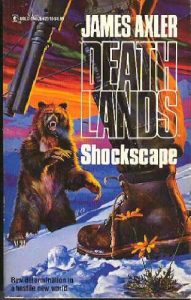 I was poised to read a Robin Hobb book, but then my schedule got pushed back, so I went for something guaranteed to be quick and easy. And then work was a bear[1], and I realized a new Walking Dead was out, so now I’m actually behind on starting the Hobb instead of ahead. Oh well, that’s what happens when I try to keep to a schedule on much of anything besides work and vacations.
I was poised to read a Robin Hobb book, but then my schedule got pushed back, so I went for something guaranteed to be quick and easy. And then work was a bear[1], and I realized a new Walking Dead was out, so now I’m actually behind on starting the Hobb instead of ahead. Oh well, that’s what happens when I try to keep to a schedule on much of anything besides work and vacations.